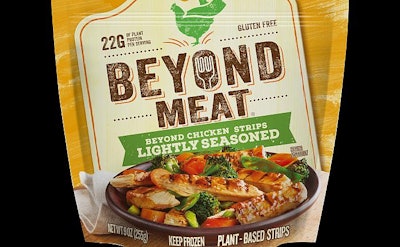
Alternative proteins are experiencing significant growth. As fresh meat protein continues to grow at a rate of 1.3%, alternative proteins are growing by 10.3%.
A recently published report from the global consultancy firm A.T. Kearney said more than 50% of meat products will be replaced by plant-based or lab-grown alternatives by 2040 and will have a huge impact on the financial status of the conventional meat market.
The report, “How Will Cultured Meat and Meat Alternatives Disrupt the Agricultural and Food Industry?” sources multiple industry members who believe consumers' meat-eating behaviors could change considerably in the coming years.
“In just two decades, 35% of meat will be grown in labs, while a further 25% will be plant based,” said Labmate when sourcing the A.T. Kearney report. Labmate is a marketplace platform connecting biopharmaceutical companies and investment firms with scientists from research institutions.
Due to almost 50% of the world's agricultural harvest being allocated to livestock feed, the A.T. Kearney report said alternative meat products are a valuable solution to the global agriculture and meat industry challenges associated with feeding the growing population more sustainably. The report also lists global warming as a potential issue in the production of traditional meat.
“The conversion rates for cultured meat and novel vegan meat replacements are more than four times higher than for conventional meat,” the A.T. Kearney report said.
In addition to the list of possible issues associated with resource challenges and the growing world population, the report said antibiotic use and animal welfare will continue to persuade consumers into buying alternative proteins.
The A.T. Kearney report said that, to this point, the meat industry has tried to combat these issues by increasing feed efficiency but that “improving the efficiency of conventional methods is not enough, in the long run, to cope with the pressing challenges of our food system.
“Instead of further optimizing conventional meat production, several companies focus on inventing new products to replace conventionally produced meat. These products range from pant-based meat alternatives and insect-based meat replacements to cultured meat.”
Companies already in this field include Impossible Foods, Just and Beyond Meat. The report said they have received substantial financing totaling approximately $900 million through 2018.
“The rise of meat replacements is backed by the wild success of companies like Beyond Meat, whose shares have soared by 550% since the (initial public offering). Overall, the plant-based meat alternatives market is valued at a huge US$4.6 billion and is projected to grow by up to 30% a year over the next decade,” Labmate stated.
State lawmakers and representatives respond to plant-based 'meat'
Some states have outlawed the labeling of a plant-based protein as meat. False or persuasive marketing claims have been making their way into the meat industry, confusing consumers and creating a demand for specialty products. In response, the state of Oklahoma recently signed a bill into place “prohibiting persons advertising or selling food plans or carcasses from engaging in certain misleading or deceptive practices."
Beef industry publication Dovers reported that “in essence, (the bill) prevents cell-cultured or plant-based products from using meat terms.”
The bill says: “Meat means any edible portion of livestock, poultry or captive cervid carcass or part thereof.”
Arkansas, which is the second largest broiler-producing state in the nation, was not the first state to write such legislation. Missouri passed its initiative into law in 2018.
Other state legislatures have at least proposed bills aimed at stopping the marketing of non-meat products as meat. Those states include Washington, Montana, Wyoming, Colorado, Arizona, New Mexico, North Dakota, Nebraska, Mississippi, Tennessee, Indiana and Virginia.
Katie Olthoff, director of communications with the Iowa Cattlemen's Association, said: “We've been really active at the national level on fake meat labeling, and explored legislation in Iowa, but discovered that Iowa's code already clearly defines meat.”

















